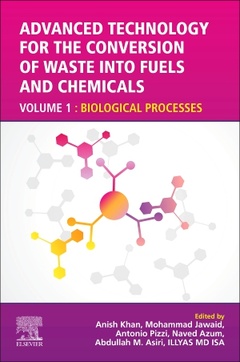Description
Advanced Technology for the Conversion of Waste into Fuels and Chemicals
Volume 1: Biological Processes
Coordinators: Khan Anish, Jawaid Mohammad, Pizzi Antonio, Azum Naved, Asiri Abdullah M., Isa Illyas M.D.
Language: English
Subject for Advanced Technology for the Conversion of Waste into...:
Keywords
Catalysis; catalytic pyrolysis; waste; biogas; aviation fuel; cellulosic waste; lignocellulose; renewable; textile waste; microbial fuel cell; fuel cell; bioelectrochemical; value-added; liquid fuel; diesel engine performance; Escherichia coli; circular economy; waste valorization; solar fuels; fine chemicals; carbon dioxide; nanomaterials; solid oxide fuel; energetic valorization; tires; sustainability; PV; photovoltaic; pyroelectric; waste management; laboratory waste; industrial waste; municipal waste
538 p. · 15.2x22.8 cm · Paperback
Description
/li>Contents
/li>Biography
/li>Comment
/li>
Advanced Technology for the Conversion of Waste into Fuels and Chemicals: Volume 1: Biological Processes presents advanced and combined techniques that can be used to convert waste to energy, including combustion, gasification, paralysis, anaerobic digestion and fermentation. The book focuses on solid waste conversion to fuel and energy and presents the latest advances in the design, manufacture, and application of conversion technologies. Contributors from the fields of physics, chemistry, metallurgy, engineering and manufacturing present a truly trans-disciplinary picture of the field. Chapters cover important aspects surrounding the conversion of solid waste into fuel and chemicals, describing how valuable energy can be recouped from various waste materials.
As huge volumes of solid waste are produced globally while huge amounts of energy are produced from fossil fuels, the technologies described in this comprehensive book provide the information necessary to pursue clean, sustainable power from waste material.
2. Catalytic pyrolysis production of Jet fuel from waste plastics
3. The potential of sustainable biogas production from animal waste
4. Integrated Conversion of waste Cellulosic waste to High-Density Aviation Fuel Thermochemical, and conversion methods of bio-derived lignocellulosic waste molecules into renewable fuels
5. Biological conversion of lignocellulosic waste into renewable energy.
6. Biochemical conversion of lignocellulosic waste into renewable energy
7. Hybrid conversion of lignocelluloses into renewable energy
8. Textile waste to a bio-energy conversion strategies
9. Microbial fuel cell technology for Bioelectrochemical conversion of waste to energy
10. Catalytic Production of Value-Added Chemicals and Liquid Fuels from waste
11. Production of fuels and chemicals from renewable resources using engineered Escherichia coli
12. Diesel engine performance and emissions with fuels derived from waste tyres
13. Waste to Chemicals for a Circular Economy
14. Current and future trends in food waste valorization for the production of chemicals, materials and fuels
15. Perspectives and State of the Art in Producing Solar Fuels and Chemicals from CO2
16. Fine Chemicals: Technology and Products
17. Waste to liquid fuels: potency, progress and challenges
18. Nanomaterials for the Conversion of Carbon Dioxide into Renewable Fuels
19. Integrated Conversion of Cellulose to High-Density Aviation Fuel
20. Recent trends on the waste valorization techniques for food wastes
21. Waists treatments for energy technology
22. Solid oxide fuel cell technology for sustainable development
23. Energetic valorization of waste tires
24. Advanced Vehicle Systems and Technologies: Economic and Environmental Implications
25. Assessment of the energy recovery potential of waste Photovoltaic (PV) modules
26. New approach to waste-heat energy harvesting: pyroelectric energy conversion
27. Case study of industrial conversion of solid waste into energy or chemicals
28. Laboratory waste management for useful cause
Mohammad Jawaid is Fellow Researcher (Associate Professor) at the Biocomposite Technology Laboratory, Institute of Tropical Forestry and Forest Products (INTROP), Universiti Putra Malaysia, Serdang, Selangor, Malaysia and also Visiting Professor at the Department of Chemical Engineering, College of Engineering, King Saud U
- Presents the latest advances in waste to energy techniques for converting solid waste to valuable fuel and energy
- Brings together contributors from physics, chemistry, metallurgy, engineering and the manufacturing industry
- Includes advanced techniques such as combustion, gasification, paralysis, anaerobic digestion and fermentation
- Goes far beyond municipal waste, including discussions on recouping valuable energy from a variety of industrial waste materials
- Describes how waste to energy technologies present an enormous opportunity for clean, sustainable energy




